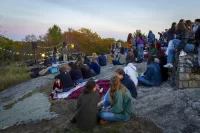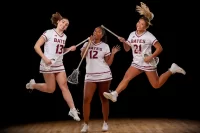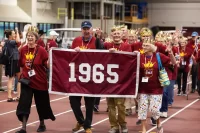
William Faulkner said a story must evoke “truths of the heart,” those being “love and honor and pity and pride and compassion and grief.”
Each fall and winter, the semester-long Dinner Table program culminates in an evening of student storytelling that celebrates and honors those “truths of the heart.”
Sponsored by the Office of Equity and Diversity, The Dinner Table format is deceptively simple. Each Sunday evening during the semester, student participants share a meal and prompt-based conversation.
“It taps into one of Bates’ enduring treasures: our value of community.”
Facilitated by fellow students and adults, the mealtime conversations help “students identify and discuss common themes and ideas,” says Professor of English Crystal Williams, an associate vice president for strategic initiatives who heads up the Office of Equity and Diversity.
Along the way, “they learn about ways in which they are connected to their peers that may not seem obvious at first glance.”
The program’s success — upwards of 100 students participate each semester — “suggests that it taps into one of Bates’ enduring treasures: our value of community,” Williams says.
Below are selected stories from two recent Dinner Table storytelling evenings.
Chirayu Baral ’19 of Thane, India
Chirayu Baral grew up in Mumbai, India, a “strange and funny place where it is totally fine for a 45-year-old to live with his parents without someone cracking a joke about it.”
But Baral “wanted to do things differently,” and that meant Bates.
Once Baral got to campus, his doting mom — who had offered to leave her job in order to spend more time with Baral before he left for Bates — began calling four to five times a day.
That bugged Baral. “I felt that my ship had long sailed from India, and my mom was trying to anchor it back to Mumbai.” Then one Sunday evening in Commons, Baral was looking for a place to sit but “could not find someone who knew me. I felt lost.”
Suddenly, he realized how his mom felt.
Nolan Burgos ’18 of Yonkers, N.Y.
“Have any of you ever felt alone? If you have, I feel you,” said Nolan Burgos as he began a story about friendship and heartache, and how he found comfort when it didn’t seem that anyone was there for him.
Burgos’ story centered on his best friend, Matt. The friends went out for lacrosse even though neither had ever played the sport.
“We were bad. Really bad,” Burgos said. “But it was great, because we were bad together. That motivated us.” Together, they got good. Together, they became co-captains.
Zoe Moss ’17 of Highland Park, Ill.
Zoe Moss told a study-abroad story about her and a friend’s well-planned trip from Morocco to Prague. Requiring a boat, two buses, a train, and two planes, the trip got derailed by the 2016 terrorist bombings in Brussels.
Grounded in Brussels, she noticed that her boyfriend back in the U.S. had suddenly stopped texting her.
Moss feared that he had, somehow, landed in jail, a suspicion that she shared with various Bates friends studying in various far-off locales. “So I got laughed at by people on three different continents,” she said.
Then she saw the mug shot.
Austin Sansone ’20 of New York, N.Y.
“Who here knows someone with a learning disability?” Austin Sansone asked his audience. “For those of you who don’t: Hello, I’m Austin Sansone.”
During high school, Sansone began to resent his dyslexia. When others got to learn a foreign language, he had to continue his sessions with a specialist. “Others learned Spanish. I was learning English.”
Friends would comment on how he got extra time on tests. “Without fail, they would always say, ‘Oh, you’re so lucky. I would do so much better if I had extra time.”
He hated it when he and the other “extra-time kids” had to leave a classroom to take their test elsewhere. But that changed in his senior year.
Nathan Dana ’17 of Boulder, Colo.
Nathan Dana got a call from his mom one day: His grandfather had cancer. “Which one? Papa, or Pop-Pop?” asked Dana.
As a boy, Dana gave his grandfathers mnemonic names. His paternal grandfather in Colorado was Papa in the Mountains. His maternal grandfather in rural Pennsylvania was Pop Pop in the Woods.
And it was Pop Pop in the Woods who had terminal cancer. During his final hospital stay, he had a picture of Dana, studying in China at the time, taped to the side of his wardrobe.
Half a world away, “that’s all I could be for him,” said Dana. “I couldn’t be anything more than a picture on a wall.”
Calvin Reedy ’17 of Wilton, Conn.
Calvin Reedy told his audience about the last day of his semester abroad. On an island off the coast of Dakar, Senegal, he was sobbing.
Reedy was visiting Gorée Island, site of the House of Slaves memorial to the Atlantic slave trade. As he stood in the Door of No Return, through which slaves left the African continent, “I could not fathom the fact that I had been there after so much time,” said Reedy, the great-great-grandchild of slaves.
“Every single part of me realized that the blood that runs through my veins had gone through that door time and time again,” said Reedy. “My knees buckled, and I began to sob.”
Anna Mendonca ’18 of Lovettsville, Va.
Anna Mendonca got a laugh with her story about seeking a comfort animal. The college Health Center, she said, “does not consider loneliness adequate reasoning for getting a miniature pony as an emotional support animal.”
A pony was out, as was a dog, so “a fish was the next best thing,” she said.
She got a blue beta fish that she named Boaty McBoatfish, and despite her friends’ protests — Don’t get a fish! You’ll kill a fish! — her new pet helped fill a hole. “I liked having something to come home to.”
But then Boaty got sick.
Jesse Saffeir ’20 of Pownal, Maine
Jesse Saffeir began her story by saying that she lived in her car last year. She described sitting at an old gas station eating tuna fish and beans out of a can.
Then she went back to her childhood on a small Maine farm, “a little wooden house, next to a little wooden barn, surrounded by a lawn.” Beyond the lawn were woods. “I wondered what was out there. I had an urge to see what was in the rest of the world.”
She gave in to wanderlust as a teenager, but has since found that relentless travel has erased a traditional meaning of “home.” When someone asked, “Where do you live?” Saffeir didn’t know what to say, which was “troubling because home is central to one’s identity.”
Emily Bowen ’19 of Pasadena, Calif.
Emily Bowen took her audience back to the first day of school.
“You know what’s more awkward than peeing your pants or calling your teacher ‘Mom’ on the first day of school? Being called out for looking different than everybody around you,” said Bowen, describing a fourth-grade icebreaker that ended with Bowen’s race being noted as her unique quality.
In high school, Bowen threw herself into academics and extracurriculars, trying to create an identity that went beyond being one of her private school’s only African American students.
“And I got over that insecurity,” she said. And then came graduation.
Elle Mata ’17 of Salinas, Calif.
“I was facing one of the most difficult things I had ever faced,” Elle Mata told her audience. “Doing the laundry by myself.”
Mata talked humorously about taking on a maternal role in her family during her mother’s health crisis. Her mom is a woman “in constant movement. She does everything for us.” Suddenly, that responsibility became Mata’s.
When choosing a college, Mata struggled to explain that this decision was about what she wanted, not her family. She wanted to make a name for herself, even if it meant going to college all the way across the U.S.
And that didn’t sit well with her family.
Essence Hill ’17 of Chicago
As a child, Essence Hill loved ballet lessons but performing was terrifying.
At Bates, she decided to give performing another shot, taking introductory ballet before progressing to an advanced modern dance course, which was intimidating.
“I’m like, you can’t do this, girl,” Hill said. But she stuck with it, and along the way has learned to embrace her own dance abilities, however imperfect.
“I have my days when I feel like the oddball out, but I just figure out how to move,” she said. “I can’t move like butter. That’s not going to happen. But I can move like jelly.”
Katharine Gaillard ’19 of Exeter, N.H.
The doctor took her height and weight, said Katharine Gaillard, and then showed her growth curve.
“My curve goes up like normal, then drops like a cliff,” Gaillard said. “And I realize what I’ve done to myself.”
High school had included some great experiences, including a semester at an outdoors-oriented school and a 30-day backpacking trip in Wyoming.
But as she tried to integrate all those experiences — along with trying to present herself through her college applications — Gaillard began to create a “perfect picture of Katharine Gaillard,” one partially defined by a perfect body image.
It was, she said, a “picture of a being that wouldn’t be able to exist.”
Morgan Leeson ’18 of Salem, Va.
“At age 10, my life changed, all because of some creep in a truck,” Morgan Leeson told her audience.
Morgan went through puberty at a relatively young age, which altered friendships and limited her independence, especially after two men in a pickup shouted lewd comments at her.
The neighborhood pool was “where I could always guarantee that all of my school friends would be.” But that changed, too. “Nothing puts your body on display or makes it a spectacle quite like the neighborhood pool.” It set her apart from her peers.
At age 10, “I had received this new set of rules for what felt like I had done nothing to deserve.”
Martin Harrison ’17 of Beachwood, Ohio
There were two Martin Harrisons, and one had to go, he told his audience.
As Harrison’s favorite author, Kurt Vonnegut, once said, “We are who we pretend to be, so we must be careful about what we pretend to be.” “But I didn’t listen,” Harrison said.
When his family moved to the United Arab Emirates, Harrison decided to change his personality. He wanted to be cool. He made a list of things that cool kids did “that I did not do.”
And it worked out, sort of. “I had a great high school experience,” he said. But at Bates, he tried the same gambit, but it didn’t work so well, and he realized that the two Martins in his head “hated each other.” So he set out to rid himself of one.




